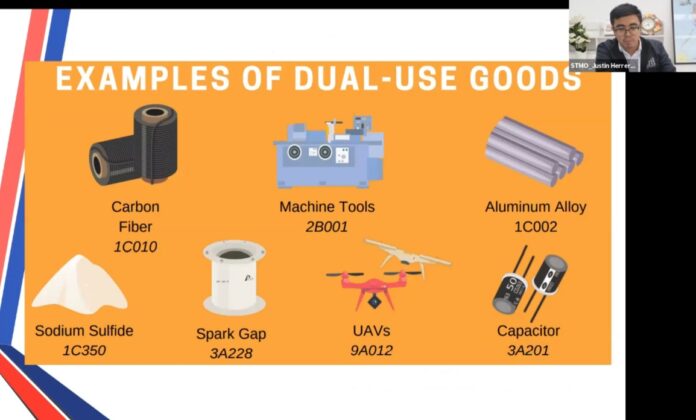
-
Penalties under the Strategic Trade and Management Act will be lifted on January 1, 2022
-
The imposition of administrative penalties under the STMA was suspended last year due to the COVID-19 pandemic
-
The Strategic Trade and Management Office reiterated that STMA-covered persons engaged in the export of strategic goods, and the export, financing or brokering activities under the National Strategic Goods List are obliged to register and apply for authorization
The temporary suspension of administrative penalties under the Strategic Trade and Management Act (STMA) will be lifted on January 1, 2022, according to a Department of Trade and Industry (DTI) order.
DTI Memorandum Circular (MC) 21-27 dated July 7, however, said the suspended administrative penalties may still be imposed if companies fail to adhere to warning letters for corrective action issued by the Strategic Trade Management Office (STMO).
DTI temporarily suspended the imposition of administrative penalties under the STMA last year through MC 20-27 due to the COVID-19 pandemic.
The temporary suspension is without prejudice to the filing of criminal cases.
The STMO, through MC 21-27, reiterated that STMA-covered persons engaged in the export of strategic goods under Annex 2 (dual use goods), and the export, financing or brokering activities of Annex 3 (nationally-controlled goods) of the National Strategic Goods List (NSGL) are obligated to register and apply for authorization.
An office under the DTI, the STMO is the executive and technical agency of the government that establishes management systems for trade in strategic goods pursuant to STMA.
READ: DTI advises product verification even while STMA penalties remain suspended
Early this year, STMO Policy and Enterprise Relations Division supervising specialist Justin Herrera in an industry webinar advised stakeholders, particularly exporters, to start checking if their products are classified as strategic goods needing authorization to export while administrative penalties are still suspended so as to avoid future violations.
He warned that even as administrative penalties are suspended, companies found to be violating the law may still face criminal liabilities.
Under STMA’s implementing rules and regulations, any person found to have violated the law will be imposed with administrative penalty, which includes limitation, revocation, or annulment of any authorization and/or registration. The person will also be fined up to P250,000, or twice the value of the strategic good or related service under the contract, or as assessed by the STMO.
Upon the request of the Securities and Exchange Commission, DTI, or any other relevant government agencies, STMO can also order that the registration and authorization to operate the partnership, corporation, association, and other juridical entity be cancelled or suspended.
STMA, or Republic Act (RA) No. 10697 (An Act Preventing the Proliferation of Weapons of Mass Destruction [WMD] by Managing the Trade in Strategic Goods, the Provision of Related Service, and for Other Purposes), was signed in 2016 to comply with United Nations (UN) Security Council Resolution No. 1540.
The UN resolution “imposes binding obligations on all states to adopt legislation to prevent the proliferation of nuclear, chemical and biological weapons, and their means of delivery, and establish appropriate domestic controls over related materials to prevent their illicit trafficking.”
Strategic goods are products that, due to security reasons or to international agreements, are considered to be of such military importance that their export is either subject to specific conditions or prohibited altogether. The law also covers the control of transmission of intangibles such as software and technology.
Under the law, traders, transport companies, and logistics service providers moving strategic goods need to be registered and licensed with the STMO.
The STMA regulates the export, import, transit and transshipment, re-export and reassignment of strategic goods, software and technology and the provision of related services in order to prevent WMD from proliferating.
The law is currently implemented in phases, with exports as the first covered sector.
Registration is required before the company can apply for authorization to export strategic goods. The authorization permits only a specific transaction, or a series of transactions, as described in the application and any supporting documents.
The NSGL is a list of the strategic goods that need authorization and has three annexes: military goods, dual-use goods, and nationally controlled goods.
Military goods refer to goods, software, and technology that are specifically designed, developed, configured, adapted, or modified for military end-use.
Dual-use goods refer to items, software, and technology which are intended for both civil and military end-use, or are used to develop, produce, handle, operate, maintain, store, detect, identify, or disseminate WMD or their means of delivery.
Nationally controlled goods, on the other hand, refer to strategic goods placed under unilateral controls for reasons of national security, foreign policy, antiterrorism, crime control, and public safety.
STMO coverage will gradually extend to other types of shipments, including transit/transhipment, re-export/re-assignment, related services (e.g. transporting, brokering), and imports.
Under STMO’s roadmap, imports may be implemented last on 2028.
Earlier, STMO said it would focus more on exports than imports, as the latter is already regulated by other government agencies such as the Philippine Drug Enforcement Agency and Philippine National Police-Firearms and Explosives Division. – Roumina Pablo




